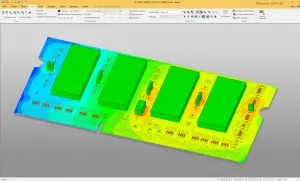Vapor-compression cooling can be found in virtually any home, such as in air conditioners that remove heat from our homes and in refrigerators that store our food. The history of vapor-compression goes back to 1805 where Oliver Evans, an American inventor, described a closed vapor-compression refrigeration cycle for producing ice. The first working vapor-compression … [Read more...]
Advanced Cooling for Power Electronics
Power electronics devices such as MOSFETs, GTOs, IGBTs, IGCTs etc. are now widely used to efficiently deliver electrical power in home electronics, industrial drives, telecommunication, transport, electric grid and numerous other applications. This paper discusses cooling technologies that have evolved in step to remove increasing levels of heat dissipation and manage junction … [Read more...]
Simulate electronics cooling strategies to design products more effectively
Sponsored by ANSYS Determine the Thermal Signature of an Electronic System As electronic devices become smaller, denser and faster, the structural and thermal integrity of their electronic packages and printed circuit boards (PCBs) becomes more critical. Heat affects the performance and reliability of integrated circuits (ICs) and may cause failure. Keep things running … [Read more...]
Computational Modeling of a Novel End-of-Aisle Close-Coupled Cooling Solution
Data centers are mostly managed by overly conservative thermal management approaches [1]. The typical thermal solution for data centers is perimeter computer room air handlers (CRAH). The traditional cooling method includes supplying air through raised floor plenum that is blown by the CRAH blowers, and the chassis fans, typically located at the rear end of the IT equipment, … [Read more...]
The Problem with Effective Thermal Conductivity
Simply stated, the problem with the use of volume weighted, effective thermal conductivity, kvw, in the thermal modeling of a printed circuit board (PCB), is inaccuracy. In this paper, we show how using kvw can lead to serious errors in the prediction of PCB temperatures. We recommend two, related, alternative procedures that provide greater … [Read more...]
- « Previous Page
- 1
- …
- 6
- 7
- 8
- 9
- 10
- …
- 127
- Next Page »








